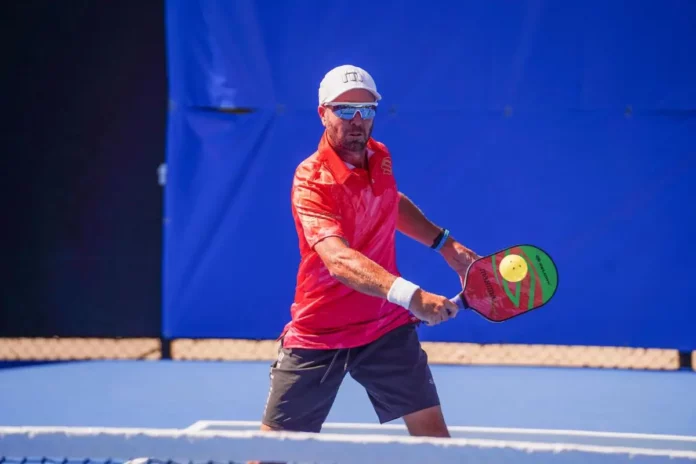How Players Stay Relevant in Pickleball Matches: Pickleball is more than just strategy and skill—it’s a battle for influence on the court. For dominant players, the challenge often lies in being deliberately avoided by opponents. Pickleball coach Morgan Evans provides expert pickleball tips on how to make yourself more effective at the kitchen line when opponents are keeping the ball away.
Evans emphasizes that while being the dominant player comes with challenges, there are tactical adjustments that can help you stay engaged and impactful. Here’s a breakdown of strategies designed to turn the tide in your favor.

Positioning for Success at the Kitchen Line
One of the first adjustments for a dominant player is positioning at the kitchen line. Evans suggests right-handed players take the left side of the court, utilizing their forehand for middle attacks, counterattacks, and tricky dinks.
Spacing with your partner is equally critical. Getting closer to your partner can tempt opponents into targeting your sideline, creating opportunities to intercept plays. Evans recommends practicing cross-step footwork to handle sideline attacks efficiently, pivoting quickly to counter moves through the middle. In situations where dinks dominate the game, creativity becomes a key factor. Kitchen play offers less time to poach, so patience and precision are crucial.
Deploying the Erne and Dink Tactics
Evans encourages dominant players to use the Erne, a pickleball technique where you leap over or near the sideline to intercept a ball. Even the threat of an Erne can disrupt your opponents’ rhythm and redirect balls toward you.
Another effective strategy is having your partner dink down the line. This forces opponents to make a high-risk play: a perfect return, an attack on your partner, or a crosscourt dink that brings the ball to you. When combined with the Erne threat, this tactic becomes even more potent.
The Offensive Lob as a Game-Changer
Lobbing, traditionally seen as a defensive move, has evolved into a powerful offensive tool in modern pickleball. In doubles play, Evans recommends placing your partner on the right side to maximize their crosscourt lobbing opportunities.
Once the lob is in motion, Evans advises taking control of the middle to intercept returns meant for your partner. While this requires excellent timing and anticipation, it ensures you remain a key player in the rally.
Evans also stresses the importance of choosing to take on difficult shots. Tough plays may not always succeed, but they keep you engaged and prevent your role from being minimized on the court.
Communication: Aligning with the Partner
Assertiveness starts with clear communication. A dominant player must align with their partner, ensuring both players are on the same page about the strategy. Evans recommends using a constructive tone to frame the conversation:
- What not to say: “What are we even doing? Should we just move to a tennis court?”
- What to say: “This is a tough team. How about I try to take some pressure off you by getting more involved? What do you think?”
A positive, solution-oriented approach can foster cooperation and make your partner more receptive to adjusting tactics for your team’s benefit.
Turning the Tide Against Elite Opponents
When opponents avoid you, the goal is to force them to play to your strengths. Evans highlights the importance of consistent practice in these situations, explaining that as your skills improve, your opponents will eventually be compelled to engage you.
In recreational play, Evans suggests a different approach: ask opponents to involve you more actively, framing it as an opportunity for their growth. Let them know that learning how to counter a strong player like you will enhance their skills, even if it means sacrificing a win.
News in Brief: How Players Stay Relevant in Pickleball Matches
Pickleball coach Morgan Evans offers strategies for dominant players who are often avoided by opponents. Key tactics include positioning at the kitchen line, using the Erne to intercept balls, and employing offensive lobs to keep the opponent engaged. Effective communication with a partner is essential to align strategies, while patience and creativity are crucial during dink-heavy games.
Morgan Evans also recommends practicing tough shots to stay involved in rallies. By forcing opponents to play to their strengths, dominant players can maintain control of the game and continue to impact the match, even when avoided.
ALSO READ: Avoid This Game-Changing Pickleball Error Which Can Ruin the Entire Progress!

